Common Irregularities
An irregularity is any occurrence in a game that goes against the standard rules or procedures of that game. It is inevitable that occasionally when playing cards the occasional error may occur. To rectify this and offset any potential advantage the irregularity may provide the player causing it, many games have various penalties that may be assessed against the player committing the irregularity.
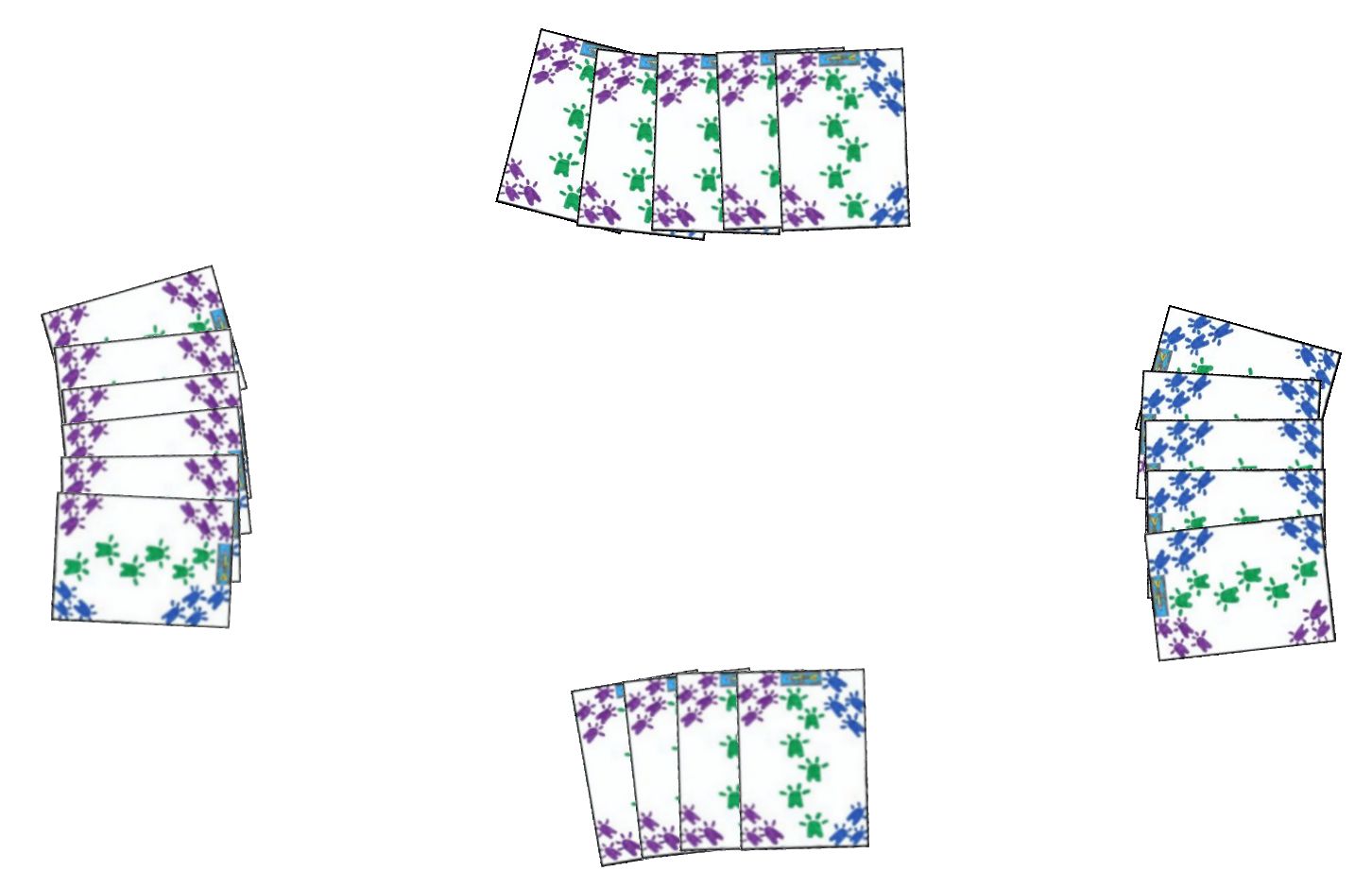 For the player who intentionally and repeatedly causes such disruptions in the game and rules, the best remedy is to simply refuse to play with such a person. However, in most circumstances these errors are accidental or unintentional.
There are a great number of potential such errors that might occur during a game, and many games have an extended list of irregularities and associated penalties. Below is a list of some of the common irregularities that might occur during games of cards. In any event, if a game rules describe a specific rule for dealing with an irregularity, those rules should be followed, with any given here to be used as a general rule for many situations. This particular page will not deal with irregularities and situations that are specific to one game or small group of games, but those irregularities are often included with the official rule for that game. Oftentimes, many casual irregularities may be overlooked, but when in a contest or tournament setting these rules and irregularities are usually more rigorously enforced.
For the player who intentionally and repeatedly causes such disruptions in the game and rules, the best remedy is to simply refuse to play with such a person. However, in most circumstances these errors are accidental or unintentional.
There are a great number of potential such errors that might occur during a game, and many games have an extended list of irregularities and associated penalties. Below is a list of some of the common irregularities that might occur during games of cards. In any event, if a game rules describe a specific rule for dealing with an irregularity, those rules should be followed, with any given here to be used as a general rule for many situations. This particular page will not deal with irregularities and situations that are specific to one game or small group of games, but those irregularities are often included with the official rule for that game. Oftentimes, many casual irregularities may be overlooked, but when in a contest or tournament setting these rules and irregularities are usually more rigorously enforced.
In a situation where an error is committed in which no rule, general or specific, applies for the error, the other players in the game should discuss an appropriate remediation inline with the seriousness of the error committed.
The Deck
Improper Pack: If it is found, during any stage of a game, that the pack is improper the current hand is usually immediately abandoned. Any scores leading up to that point, however, still stand. This incorrect pack may be due to a deck that has more cards than the current game calls for or too few. In either event, the current deck should either be made correct by adding or removing appropriate cards. If this is impossible (due to missing cards, for instance), the pack should be replaced with a correct one for the game at hand.
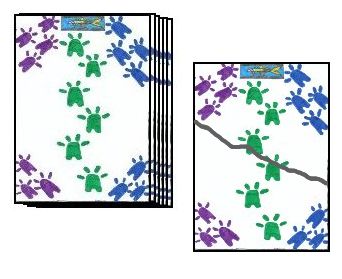 Identifiable Cards in Deck: It may also come about through play that through wear or other events one or more cards become scuffed or marked in such a way that they can be distinguished from other cards in the pack from the back. When this is discovered, the current hand should be played out with all scores standing. However, at the completion of the current hand, the deck should be immediately replaced for the next hand with a deck that has no cards that can be thusly distinguished from the backs.
Identifiable Cards in Deck: It may also come about through play that through wear or other events one or more cards become scuffed or marked in such a way that they can be distinguished from other cards in the pack from the back. When this is discovered, the current hand should be played out with all scores standing. However, at the completion of the current hand, the deck should be immediately replaced for the next hand with a deck that has no cards that can be thusly distinguished from the backs.
Dealing, Cutting and Shuffling Irregularities
As dealing, cutting and shuffling are common to just about any game of cards played, it is also common for errors to occur during such actions. The following cover some of the common irregularities and appropriate general penalties for committing them.
Deal out of Turn: Most games have a specific rotation for the deal between hands or games. If another player, other than the one who has the right to deal on the hand deals the cards and it is discovered and attention is called to it before the last card of the hand is dealt, any player may call for a redeal. All the cards are thus gathered, reshuffled and cut and the dealt started again, this time by the correct dealer in turn. Once the last card is dealt and the hand begins, the current deal is played out and the next hand would be dealt by the player coming next in line after the current player who dealt out of turn.
Exposed Card During the Deal: If while dealing, the dealer exposes a card that, according to the game rules is intended to be dealt face down, any player may immediately demand a redeal. This must be requested before the hand begins. Once the hand begins the deal stands. Thus, all the cards are gathered up and the same dealer would deal the cards as necessary for the game to be played. If a player, himself unintentionally exposes a card while picking up his card and before the seeing the remaining cards, may also request a redeal by the same dealer.
No Cut: If the dealer forgets to request a cut from an appropriate player, any player may demand a redeal by the same dealer. This may be demanded at any time up to the beginning of the actual hand. Once the hand begins the deal stands. If the redeal is demanded, the deck is gathered together reshuffled and then cut before the deal, which is performed by the same player.
No Shuffle: If neither the dealer or any other player shuffles the deck before dealing the hand, any player may demand a redeal by the same dealer. This dealer would then ensure to thoroughly shuffle and cut the deck before dealing any cards. This only occurs if demanded before the actual play of the hand begins.
Improper Number of Cards in a Players Hand: If a player finds that at the completion of a deal he has too few or too many cards dealt to him there must be a redeal by the same dealer at the demand of any player. This may be demanded at any time before the end of the hand, but the incorrect number of cards must be shown to have been caused by an improper deal and not an error during play of the hand. No score is recorded for the current hand and the deal passes to the next player in turn.
Exposed Card During Cut or Shuffle: If during the shuffle or cut and before any cards are dealt, the dealer exposes one or more cards, he should simply begin this procedure again, shuffling and cutting before dealing any cards.
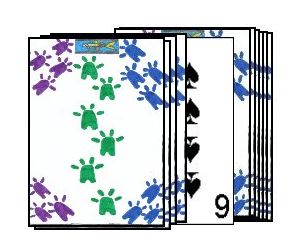 Faced Card Discovered in Deck: If during the shuffle and cut one or more cards are found faced (the face of the card is showing vice the back), the current dealer should begin the shuffle and cut procedure over after righting the faced card. If a faced card is found in the deck during the deal, any player, including the dealer may immediately declare a misdeal and gather all of the cards and, after righting the incorrect card, shuffle and cut again before redealing. No player, however, may call for this misdeal if they have already looked at their hands. For this reason, it is recommended that the players do not pick up their hands for examination until all cards have been dealt.
Faced Card Discovered in Deck: If during the shuffle and cut one or more cards are found faced (the face of the card is showing vice the back), the current dealer should begin the shuffle and cut procedure over after righting the faced card. If a faced card is found in the deck during the deal, any player, including the dealer may immediately declare a misdeal and gather all of the cards and, after righting the incorrect card, shuffle and cut again before redealing. No player, however, may call for this misdeal if they have already looked at their hands. For this reason, it is recommended that the players do not pick up their hands for examination until all cards have been dealt.
Incorrect Dealing Procedure: There are several different ways in which the hand could be misdealt. This would include dealing in the wrong direction, too many or too few cards in a particular packet during the deal, and other similar errors. As in many of the other dealing penalties, any player may call for a new deal providing no one has yet looked at their hand. If any player has already picked up and examined his hand, the current deal stands. Any error or irregularity the requires a new deal is called a misdeal.
Player exposing card from his own hand: If during play a player drops a card in such a way that it becomes exposed to others at the table he may faced with penalties. In non-partnership games the exposed card is simply left face up on the table in front of the player until he elects to play it. In a partnership game, the card also remains face up in front of the player, but becomes a penalty card. This penalty card must be played, on that players regular turn, when any of his opponents demand it (and would be a legal play to do so).
Leading out of turn: In a game where each participant plays one card to a trick or other, the player who has the opportunity to lead to the first trick is governed by the rules of the game. If a player, who does not have that right by the rules of that game, plays that first card he is leading out of turn. If the error is discovered before any other players have played to the trick, the player may retract the card and add it back to his hand, playing any legal card to the trick. Each other player, however, should be given the opportunity to see the face of the card before he adds it back to his hand. If the error is not discovered until one or more other players have also played to the trick, the trick stands as is. However, regardless of whoever wins the trick, the original player whose turn it would have been has the option, if they request it, to lead to the next trick.
Playing out of turn: If a player attempts to make his play when it is not his turn, a penalty may be assessed. If the error is discovered before the next player in turn has made their play, the individual who played the card may pick up his card and add it back to his hand. He must give the other players an opportunity to see the card played and he may not play that particular card on his next turn unless that card would be his only legal play. If, however, one or more of the players opponents have also taken their turn after the offending player, the play stands with no penalty assessed.
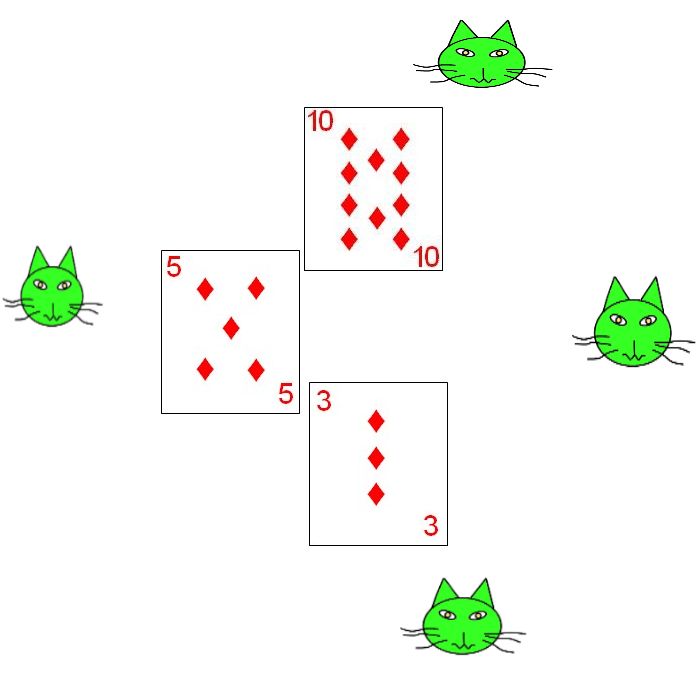 Invalid Number of Cards Played to Trick: There are several instances where a trick may have the incorrect number of cards played to it. If no more than one card has been played to the following trick, the player who played too few or too many cards to the trick may correct his error. However, if two or more players have played to the next trick, the following rules should be used to rectify the error. If found that a player failed to play a card to the trick, he must immediately play a legal card to the trick (at which time the winner of the trick can be determined). If a player played too many cards to a trick (for most games, only one card is played per player per trick), the offending player must leave the additional cards in the trick. That player can still win the trick, however, since he has too few cards for all tricks in the hand, does not play cards to the last trick as appropriate (and thus cannot win those tricks). If the player happens to win a trick with the last card in his hand, the right to lead to the next trick rotates to the player to the next valid player in rotation.
Invalid Number of Cards Played to Trick: There are several instances where a trick may have the incorrect number of cards played to it. If no more than one card has been played to the following trick, the player who played too few or too many cards to the trick may correct his error. However, if two or more players have played to the next trick, the following rules should be used to rectify the error. If found that a player failed to play a card to the trick, he must immediately play a legal card to the trick (at which time the winner of the trick can be determined). If a player played too many cards to a trick (for most games, only one card is played per player per trick), the offending player must leave the additional cards in the trick. That player can still win the trick, however, since he has too few cards for all tricks in the hand, does not play cards to the last trick as appropriate (and thus cannot win those tricks). If the player happens to win a trick with the last card in his hand, the right to lead to the next trick rotates to the player to the next valid player in rotation.
Invalid Meld: In games in which melding is part of the play, it may occur that a player inadvertently attempts to make an invalid meld. If this occurs while the hand is still in progress, the player must retract the meld, but must leave the cards face up in front of him until using them in a legal meld or electing to discard them.
Drawing too Many Cards: If a player draws too many cards when drawing from the discard pile he retains the extra cards in his hand. However, on subsequent turns (in which he would normally draw) he does not draw until he again has the correct number of cards he should in his hand.
Faced Card Discovered in Draw Pile: In a game that uses a face down draw pile, there is the potential to discover a faced (face of the card is visible instead of the back) card in the pile. If this occurs, the faced card should be righted, and the entire discard pile shuffled and placed back down in it's normal location, with the face of all cards aligned face down. There is no penalty for discovering such a card. If this is the last card of the draw pile, however, the card stands and the player whose turn it is to draw takes the card into their hand as a normal draw.
Card Exposed while Drawing: It may occur that when a player is drawing a card from the stock pile (in games which allow require such a draw) that one or more of the cards from the discard pile may become exposed (including any he has actually drawn). If the only card exposed was his drawn card, he must first show it to all the other players and then add it to his hand, the only penalty being the exposure of his card. However, if additional cards are exposed from the stock when drawing, the exposed cards must be displayed to all players and replaced on the top of the stock. The next player, before making his draw, can then decide to either take the top card of the stock (which he has already seen) or may demand the stock pile be reshuffled before making his draw.
Invalid Information: If a player, at any time during the hand, attempts to convey (through remarks or another manner) information to his partner regarding his hand, a preferred play or anything else that would not normally be permitted in the game, any opponent of the offending player may demand that any play that might be based on the given or received information to be removed and replaced with another legal play.
Conceding or Claiming the Hand: If a player, at any time during the play of the hand in a game involving the taking of tricks, exposes his entire hand on the table, this is considered a declaration by the player of either conceding or claiming the remaining tricks. The player must state whether he is claiming or conceding the remainder of the tricks. If he is claiming, the remainder, he must show that his hand would, in fact, win all remaining tricks in order to have the claim validated and score as appropriate for the game being played.
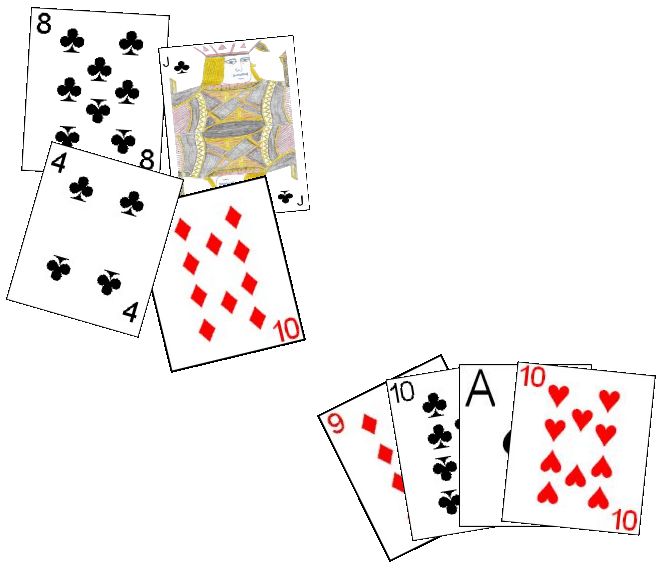 Revokes: A revoke is when a player, in a trick taking game, plays a card of another suit even if having one of the suit led. If the player discovers his mistake and corrects it before anyone plays any cards to the next trick. To correct the error, the offending player may take the invalid card back into his hand, playing the correct card to the trick. Likewise, all other players may, at their option change the cards they have played to the same trick. In addition, the improperly played card must be set in front of the offending player as a penalty card. This penalty card must be played by this player at his first legal opportunity.
Revokes: A revoke is when a player, in a trick taking game, plays a card of another suit even if having one of the suit led. If the player discovers his mistake and corrects it before anyone plays any cards to the next trick. To correct the error, the offending player may take the invalid card back into his hand, playing the correct card to the trick. Likewise, all other players may, at their option change the cards they have played to the same trick. In addition, the improperly played card must be set in front of the offending player as a penalty card. This penalty card must be played by this player at his first legal opportunity.
However, if this error is not discovered until after any cards are played to the next trick (or the next hand is started if the revoke occurs on the final trick of the hand), the error costs the offending player a penalty of two tricks in the current hand. In order to help prevent this error it is common in trick taking games for one of the opponents to state "You have no cards of the suit led?".
In any game in which there is one or more rounds of bidding, there are several irregularities that have the potential to occur.
Bid out of turn:
If a player bids when it is not his turn to do so, a penalty is usually assessed. The out of turn bid is set as invalid and the player making that invalid bid must pass until the end of the bidding round. Thus, he may make no further bids during that round of bidding.
Invalid Bid: This can happen when a player makes an invalid bid for the current situation. This may be a bid that is lower than the previous high bid (and thus not valid) or is a bid that is not valid in the current circumstances a penalty may apply. The usual penalty is that the bid does not stand and player and his partnership (if the game is a partnership game) must pass for the remainder of the bidding round. However, if the invalid bid is not discovered or mentioned before the next player completes his bid, the invalid bid stands.
Invalid Bidding Information: If a player either during his proper turn or not provides information through remarks or in another matter, that could be used to signal or influence his partner, any opponent may demand that the player or his partnership (in partnership type games) to pass for the remainder of the bidding in the current hand.
Copyright © 2015
CatsAtCards.com. All rights reserved.
 For the player who intentionally and repeatedly causes such disruptions in the game and rules, the best remedy is to simply refuse to play with such a person. However, in most circumstances these errors are accidental or unintentional.
There are a great number of potential such errors that might occur during a game, and many games have an extended list of irregularities and associated penalties. Below is a list of some of the common irregularities that might occur during games of cards. In any event, if a game rules describe a specific rule for dealing with an irregularity, those rules should be followed, with any given here to be used as a general rule for many situations. This particular page will not deal with irregularities and situations that are specific to one game or small group of games, but those irregularities are often included with the official rule for that game. Oftentimes, many casual irregularities may be overlooked, but when in a contest or tournament setting these rules and irregularities are usually more rigorously enforced.
For the player who intentionally and repeatedly causes such disruptions in the game and rules, the best remedy is to simply refuse to play with such a person. However, in most circumstances these errors are accidental or unintentional.
There are a great number of potential such errors that might occur during a game, and many games have an extended list of irregularities and associated penalties. Below is a list of some of the common irregularities that might occur during games of cards. In any event, if a game rules describe a specific rule for dealing with an irregularity, those rules should be followed, with any given here to be used as a general rule for many situations. This particular page will not deal with irregularities and situations that are specific to one game or small group of games, but those irregularities are often included with the official rule for that game. Oftentimes, many casual irregularities may be overlooked, but when in a contest or tournament setting these rules and irregularities are usually more rigorously enforced.
 Identifiable Cards in Deck: It may also come about through play that through wear or other events one or more cards become scuffed or marked in such a way that they can be distinguished from other cards in the pack from the back. When this is discovered, the current hand should be played out with all scores standing. However, at the completion of the current hand, the deck should be immediately replaced for the next hand with a deck that has no cards that can be thusly distinguished from the backs.
Identifiable Cards in Deck: It may also come about through play that through wear or other events one or more cards become scuffed or marked in such a way that they can be distinguished from other cards in the pack from the back. When this is discovered, the current hand should be played out with all scores standing. However, at the completion of the current hand, the deck should be immediately replaced for the next hand with a deck that has no cards that can be thusly distinguished from the backs.
 Faced Card Discovered in Deck: If during the shuffle and cut one or more cards are found faced (the face of the card is showing vice the back), the current dealer should begin the shuffle and cut procedure over after righting the faced card. If a faced card is found in the deck during the deal, any player, including the dealer may immediately declare a misdeal and gather all of the cards and, after righting the incorrect card, shuffle and cut again before redealing. No player, however, may call for this misdeal if they have already looked at their hands. For this reason, it is recommended that the players do not pick up their hands for examination until all cards have been dealt.
Faced Card Discovered in Deck: If during the shuffle and cut one or more cards are found faced (the face of the card is showing vice the back), the current dealer should begin the shuffle and cut procedure over after righting the faced card. If a faced card is found in the deck during the deal, any player, including the dealer may immediately declare a misdeal and gather all of the cards and, after righting the incorrect card, shuffle and cut again before redealing. No player, however, may call for this misdeal if they have already looked at their hands. For this reason, it is recommended that the players do not pick up their hands for examination until all cards have been dealt.
 Invalid Number of Cards Played to Trick: There are several instances where a trick may have the incorrect number of cards played to it. If no more than one card has been played to the following trick, the player who played too few or too many cards to the trick may correct his error. However, if two or more players have played to the next trick, the following rules should be used to rectify the error. If found that a player failed to play a card to the trick, he must immediately play a legal card to the trick (at which time the winner of the trick can be determined). If a player played too many cards to a trick (for most games, only one card is played per player per trick), the offending player must leave the additional cards in the trick. That player can still win the trick, however, since he has too few cards for all tricks in the hand, does not play cards to the last trick as appropriate (and thus cannot win those tricks). If the player happens to win a trick with the last card in his hand, the right to lead to the next trick rotates to the player to the next valid player in rotation.
Invalid Number of Cards Played to Trick: There are several instances where a trick may have the incorrect number of cards played to it. If no more than one card has been played to the following trick, the player who played too few or too many cards to the trick may correct his error. However, if two or more players have played to the next trick, the following rules should be used to rectify the error. If found that a player failed to play a card to the trick, he must immediately play a legal card to the trick (at which time the winner of the trick can be determined). If a player played too many cards to a trick (for most games, only one card is played per player per trick), the offending player must leave the additional cards in the trick. That player can still win the trick, however, since he has too few cards for all tricks in the hand, does not play cards to the last trick as appropriate (and thus cannot win those tricks). If the player happens to win a trick with the last card in his hand, the right to lead to the next trick rotates to the player to the next valid player in rotation.
 Revokes: A revoke is when a player, in a trick taking game, plays a card of another suit even if having one of the suit led. If the player discovers his mistake and corrects it before anyone plays any cards to the next trick. To correct the error, the offending player may take the invalid card back into his hand, playing the correct card to the trick. Likewise, all other players may, at their option change the cards they have played to the same trick. In addition, the improperly played card must be set in front of the offending player as a penalty card. This penalty card must be played by this player at his first legal opportunity.
Revokes: A revoke is when a player, in a trick taking game, plays a card of another suit even if having one of the suit led. If the player discovers his mistake and corrects it before anyone plays any cards to the next trick. To correct the error, the offending player may take the invalid card back into his hand, playing the correct card to the trick. Likewise, all other players may, at their option change the cards they have played to the same trick. In addition, the improperly played card must be set in front of the offending player as a penalty card. This penalty card must be played by this player at his first legal opportunity.